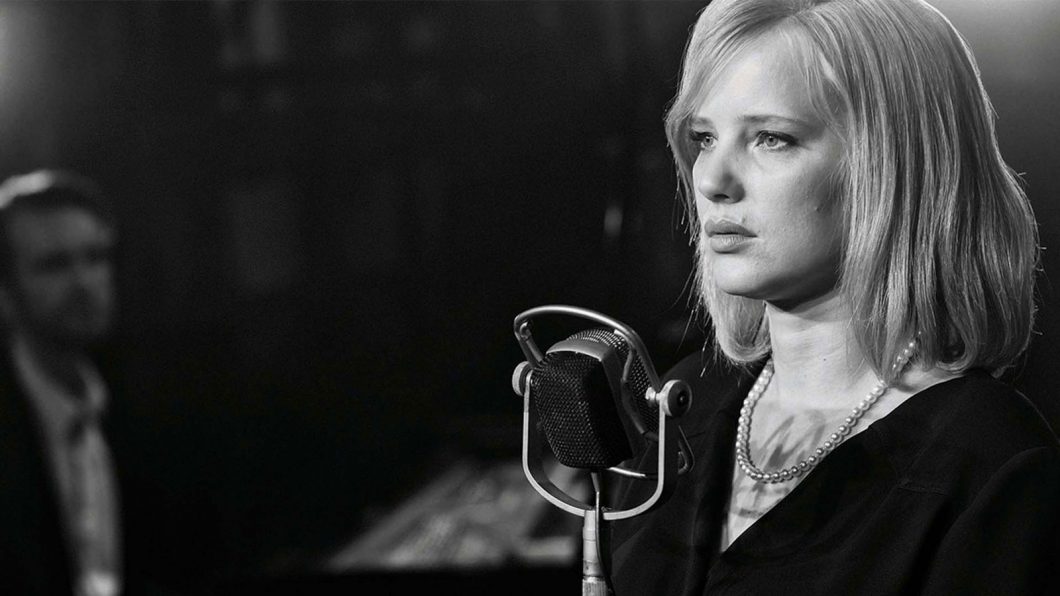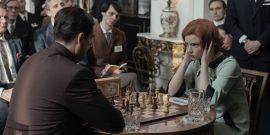The Queen’s Gambit is a feminist fantasy, with a chess prodigy forcing Cold War America to become woke sooner than it is ready.
The Problem with Paris: an Alternative Reading of Pawlikowski’s Cold War
Cold War is the second Polish-language film by the Polish-British director Pawel Pawlikowski to be given a wide release in America. Nominated for three Oscars, it has received widespread acclaim, and especially for its acting and cinematography. Reviewers are also agreed that it is a love story that, while it feels classic, is told in a fresh way. However, as the title signals, it is also war story. That is, it is a film as much about societal conflict as it is about personal love.
As we know, the term “cold war” refers to the struggle, largely a “non-shooting” one in Europe, for geostrategic advantage and ideological allegiance which took place between the Western democracies and the Eastern-bloc communist societies from 1945-1989. But as few in the West yet appreciate, the cultural division that came with that struggle was not merely two-fold, but in certain sense became three-fold. Pitted against the communist tyrannies were not only the Western democracies and their creed of democratic freedom, but also, the subjects living under the totalitarian boot who did not buy into the Marxist ideology. The beliefs of these Poles, Czechs, East Germans, etc., did not always line up with Western ones, and became more distinct as the years of separation and oppression added up. One key difference is that the Easterners opposed to communism were shaped by their actual experience of it. A select set of films since 1989, such as The Lives of Others, Goodbye, Lenin! and Burning Bush, help illustrate this different perspective.
Cold War joins them, but goes further in revealing how this perspective can offer serious criticisms of the West’s freedom.
The film’s story is partly based on the life of Pawlikowski’s parents. It begins with folk-song connoisseurs making field recordings in the late 1940s, and the government directing them to create a song and dance troupe, Mazurek, which will attractively represent Polish peasant culture to the world. A romance develops between one of these musicologists, the classically trained Wiktor, and one of the recruits for the troupe, the spirited young Zula, but is shadowed by the communists’ efforts to employ her to spy on him. Wiktor takes advantage of a performance in Berlin to flee to the West, but she hesitates to take this step, causing an extended separation. Furtive attempts to meet follow, during Mazurek tours across Europe. Eventually, Zula finds a way of getting out of Poland legally, leading to a joyous reunion in Paris; but alas, conflict between them soon develops, and results in her going back. And he follows her, exposing himself to brutal punishment by the communist regime.
Not a few reviews characterize this as a tempestuous love story whose setting happens to be that of the cold war. This is a plausible interpretation, and seems supported by aspects of Pawlikowski’s parents’ story, and by the fact that love-troubles are the subject of all the folk-songs in the film. However, here I present a sketch of an alternative interpretation.
One thing the “primarily a love story” interpretation has to downplay is the curiously mixed portrayal of Paris. In cinema’s most iconic shadowed-by-war love story, that of Rick and Ilsa in Casablanca, “we’ll always have Paris” is what Rick says to evoke the salad days of their romance; but by the end of Cold War, Wiktor and Zula would do anything not to remember Paris, for that is precisely where the decisive life-dooming trouble for them, the temporary souring of the romance for Zula, unfolds. It is all the more significant that this occurs in a series of scenes that portray Parisian “café society” at its most beguiling. Wiktor has made a place for himself at the center of it: he scores music for films, plays in a jazz band, and is friends with (and for a time was the lover of) a French poetess. And Pawlikowski delights us by cinematically immersing us in its glories: we wend our way through sophisticated parties, savor Zula’s torch-song performance, and leap into one of the most striking scenes of rock ‘n’ roll dancing ever filmed.
So why does Zula so quickly become unhappy? She arrives in 1958, after a separation of seven years, by way of a marriage of convenience to an Italian. Wiktor displays no jealous ire about the fact of her now-absent husband, but she seeks out confrontation with his former mistress, and later complains about Wiktor’s utilizing her poetic translation of a Polish song. More importantly, she says that Wiktor was “a man” back in Poland, but is “different” here. According to her, while the “French know what they are doing” with their bohemian arts and free-love, their way of life fits Wiktor poorly. There is more. She is angered when she learns he has been talking her up by exaggerating scandalous aspects of her troubled family background, and appalled when he explains that this is the way of artistic business here—that Edith Piaf, for example, became all the more loved by the Parisians when they learned she had been raised in a brothel.
Life in Paris is beautiful on the surface, but if Zula is right, it is in some way rotten underneath. To understand this film, and to see how it combines a love story with a story of fundamental regime differences, we must attempt to explore Zula’s critique, and consider its implications.
Now we could hold, as at least one reviewer has, that her critique is motivated by her own insecurities. She feels out of place with Wiktor’s intellectual friends. And she seems unable to sanely explore the new world of Western freedom, being inclined to go overboard with its greater opportunities for intoxication and flirtation. So she lashes out, and makes impossible demands. Wiktor had reason to cater to French sensibilities, having arrived in Paris with no money and no friends, but she implicitly insists that he be his own man the way he appeared to be in Poland.
No one can deny that aspects of Zula’s critique are unfair, and stem from her own issues. But a reading that entirely explains it in this way contradicts itself, for it wants us to admire Zula, but also, to regard her failure to appreciate Parisian life as thoroughly irrational. Such a reading asks us to savor her passion as the sign of a real lover, but to dismiss her reasoning as corrupted by this passion.
And it is a reading that doesn’t seem to see certain things. Take the scene of Wiktor and Zula on the Seine river-boat at night. By and large it unfolds just like the similar one presented in several Paris-celebrating films. Once again, the boat shines its light on the banks, and a couple embracing there is revealed—a classic image. But then, the camera pans up for an extended shot of Notre Dame cathedral. It is that image that catches Zula’s eye, and it connects to the haunting shots near the beginning and the end of the film of an abandoned Polish church.
Or take the album Wiktor arranged to have her record, entitled Zula. We admire him for responding to and learning to play jazz, but this is different. We first witness Zula singing a jazzy torch version of her signature song, but still in Polish; but when she records it, she sings it in French. So the album seems less a sign of cross-fertilization of cultures, and more one of Western art pulling all other modes into its own. When Wiktor calls the record “our first child,” Zula dismisses it as “a bastard” and tosses it into the gutter.
Now we could also seek to explain away Zula’s critique as one motivated by the place of her art. The first time Wiktor suggests they flee to the West, she asks, “but what will I be there?” Her artistry is the performance of existing songs and dances. It is true that this was a role created for her—she wasn’t the one who re-discovered the folk material. And it is true that because the socialist authorities tiresomely milk Mazurek for every drop of prestige they can, we have little reason to cherish that (initially innovative) utilization of folk-music over the Paris jazz. But still, Zula’s art is potent. The problem is that it is more bound to things Polish, in contrast to how Wiktor’s deeper knowledge of music allows him to enter into jazz. Perhaps we should see her as forced to choose between her artistry and her love.
The fundamental problem with this theory is that her revulsion against Wiktor in Paris has more to do with his life in general than with his or her art. She responds to his urging her in the recording session to “believe in herself” by replying that it is him she no longer believes in. When she asserts that Wiktor’s friend Michel has been having sex with her, his response is to strike her, to which she replies, “Now we’re talking!” What that underlines is the fact that they haven’t been. Again and again in the Paris scenes Wiktor gets drawn into conversation with others, and in one, he declines Zula’s request to talk about her current sadness. She is no innocent here, as there is reason to think she has been sleeping with Michel, and again, reason to think Paris repels her partly because her spirit is too wild to cope with the freedom it offers. But Wiktor’s behavior is disappointing in these scenes.
In sum, we cannot explain Zula’s reaction to Paris as only coming out of her own insecurities, whether personal or artistic. It seems she feels there were quite a few aspects of her life in Poland that were simply healthier, despite the government’s totalitarianism. Later in the film she admits she ruined things by returning—but she speaks of this in terms of “What have we done?” That indicates that in her judgment, Wiktor had responsibility for the story’s sad outcome as well.
My basic interpretation, then, is that there are aspects of Zula’s critique that are endorsed by Pawlikowski. That opens up a number of further interpretative possibilities that critics need to consider, all of which make the film far more interesting than a well-executed love story with a novel backdrop. The idea I am most intrigued by is this: Cold War is suggesting that Western freedom had its ultimate destiny already revealed in the subtle ugliness, admittedly covered over by much beauty, of 1950s Parisian life. Since today, quite a few ugly consequences of the liberal West’s shortcomings have become obvious, and play a significant role in political debates occurring in Poland especially, Pawlikowski is interested in exploring what was flawed from the beginning.
However, I do not think that Pawlikowski suggests that faced with the choice of a “Parisian” future or an enslaved communist one, that striking a third path into patriotism, perhaps aided by folk-arts, provides a solution. Cold War displays both the strengths and limitations of a “Mazurek-ian” approach to art, and hints that the source of Zula’s reaction is less a love for Poland than a belief in God. It thus leaves us with no easy answers to the big regime and “way of life” questions. This is not to say that it ever suggests that the flaws of Western freedom have a moral equivalence to the thorough corruption of communism. And it is not to rule out the possibility that it points to Christianity as a solution that transcends the political. But whatever further interpretive debates we might have, I believe we can know this: Zula’s and Wiktor’s story is fundamentally tragic as opposed to merely “tempestuous.” The tragedy is that their love was up against two regimes that in different ways both worked against it.



